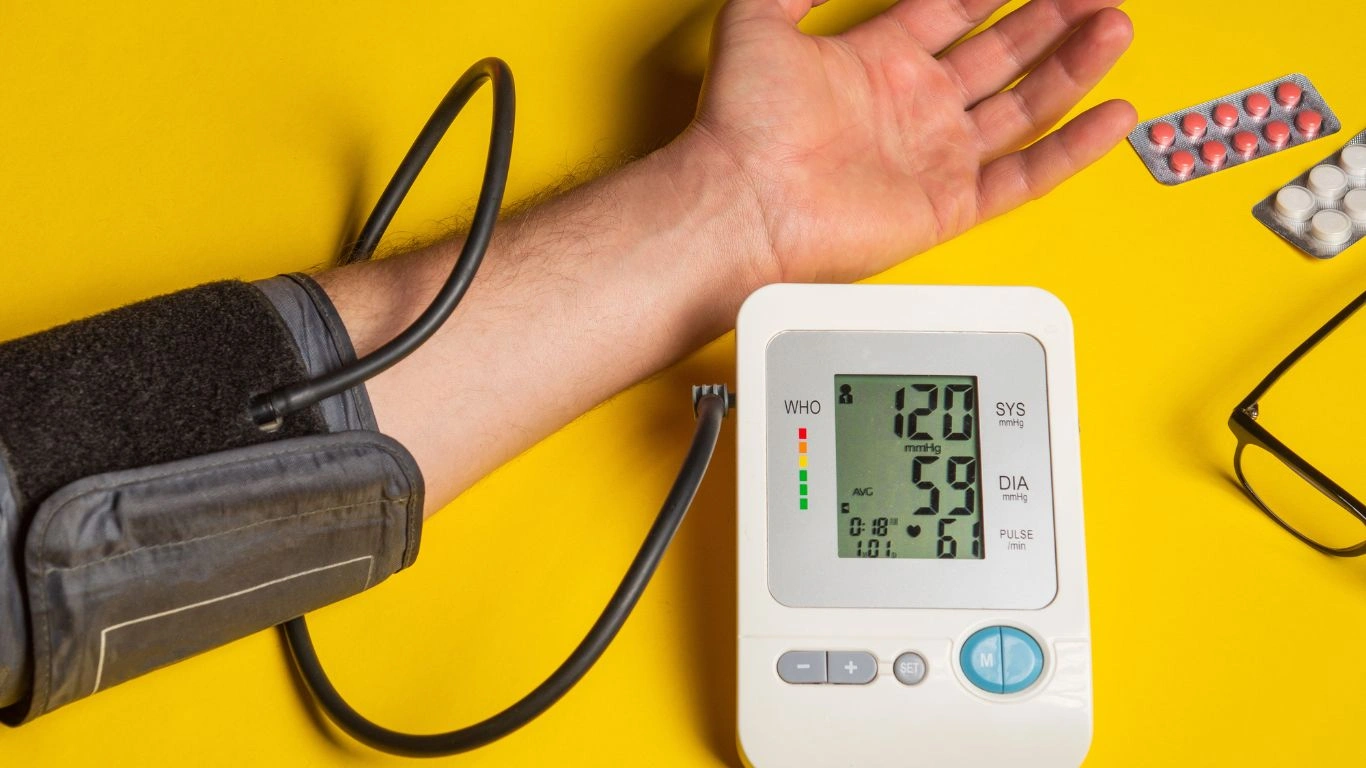How Gut Inflammation Affects Hypertension: Powerful Insights
As an Internal Medicine Physician, I’ve had the privilege of treating countless patients with hypertension. One thing that has become increasingly clear is how complex hypertension management truly is. It’s not just about prescribing medications and monitoring blood pressure—there’s a deeper connection between our overall health and our blood pressure levels. One factor that often surprises patients is the role gut inflammation plays in hypertension. You might be thinking, “Wait, how could my gut cause my blood pressure to rise?” Well, it turns out, the gut and heart are more connected than we realize, and gut inflammation can be a significant factor in the development and worsening of hypertension. Let’s dive into why that’s the case and how understanding this link can lead to better management of high blood pressure.
The Surprising Link Between Gut Health and Hypertension

In recent years, medical research has uncovered some fascinating insights into the gut’s role in regulating various bodily functions, including blood pressure. Your gut is home to trillions of microorganisms, often referred to as the microbiome, which play a crucial role in digestion, immunity, and even brain function. But what many people don’t realize is that this microbiome also has a profound impact on cardiovascular health, particularly hypertension. When your gut becomes inflamed due to poor diet, stress, or other factors, it can trigger a cascade of reactions that ultimately contribute to the development of high blood pressure.
What Exactly is Gut Inflammation?
Before we dive into how gut inflammation affects hypertension, let’s first understand what gut inflammation actually is. Gut inflammation occurs when the lining of the gastrointestinal (GI) tract becomes irritated or damaged. This irritation can be caused by a variety of factors, such as an imbalanced diet, excessive alcohol consumption, chronic stress, or even underlying conditions like irritable bowel syndrome (IBS) or celiac disease. When the gut lining is compromised, harmful substances and toxins can leak into the bloodstream, triggering an immune response that leads to inflammation throughout the body.
How Gut Inflammation Leads to High Blood Pressure
You might be wondering, “How does a swollen gut lead to hypertension?” It all comes down to the complex interplay between the gut microbiome and the immune system. Gut inflammation can disrupt the balance of beneficial and harmful bacteria in the microbiome, leading to what is known as “dysbiosis.” This imbalance has been shown to contribute to systemic inflammation, which is one of the key players in the development of hypertension.
When the gut becomes inflamed, it triggers the release of pro-inflammatory cytokines into the bloodstream. These cytokines are like little messengers that communicate with various organs and tissues in your body, including the blood vessels. One of the effects of these inflammatory molecules is that they cause the blood vessels to constrict, or narrow, which increases blood pressure. Additionally, chronic inflammation can impair the functioning of your kidneys, which play a vital role in regulating blood pressure by controlling fluid balance and sodium levels. When kidney function is compromised, the body struggles to maintain a healthy blood pressure.
The Role of the Microbiome in Hypertension

Now, let’s take a closer look at the microbiome itself. As mentioned earlier, your gut houses trillions of bacteria, some good and some bad. Under normal circumstances, the good bacteria help regulate digestion, absorb nutrients, and support immune function. However, when the balance is disturbed—whether through an unhealthy diet, lack of fiber, or excessive use of antibiotics—the bad bacteria can overpower the good ones, leading to an inflammatory response in the gut and beyond.
Emerging research has shown that an imbalanced microbiome can directly influence blood pressure. For example, certain types of bacteria are known to produce short-chain fatty acids (SCFAs) as a byproduct of fiber fermentation. SCFAs have been shown to have anti-inflammatory properties and help maintain healthy blood pressure levels. Conversely, an imbalance of gut bacteria may reduce the production of these beneficial SCFAs, contributing to chronic inflammation and hypertension.
Stress and Gut Inflammation: A Vicious Cycle
It’s important to mention that stress can exacerbate both gut inflammation and hypertension. Stress activates the body’s “fight or flight” response, which leads to the release of hormones like cortisol. While cortisol is essential for short-term survival, prolonged exposure to high levels of cortisol can damage the gut lining, leading to increased inflammation. This is a perfect storm for hypertension, as chronic stress not only raises blood pressure directly but also worsens the underlying inflammation that contributes to it.
How Diet Influences Gut Inflammation and Hypertension

The food you eat plays a major role in both gut health and blood pressure. A diet rich in processed foods, sugars, and unhealthy fats can promote gut inflammation and lead to the development of high blood pressure. On the other hand, a diet high in fiber, antioxidants, and anti-inflammatory foods can help reduce inflammation in the gut and support healthy blood pressure levels.
- Fiber-rich foods: Foods like fruits, vegetables, legumes, and whole grains are packed with fiber, which supports gut health and helps reduce inflammation.
- Omega-3 fatty acids: Found in fatty fish, flaxseeds, and walnuts, omega-3s have potent anti-inflammatory effects that can help lower blood pressure.
- Probiotics: These beneficial bacteria found in foods like yogurt and kefir can help restore balance to the microbiome and reduce gut inflammation.
- Antioxidants: Berries, dark chocolate, and green tea are just a few examples of foods rich in antioxidants, which can help fight inflammation and protect your blood vessels.
Incorporating these foods into your daily diet can go a long way in supporting both your gut health and blood pressure regulation. It’s also important to avoid foods that can trigger inflammation, such as sugary snacks, processed meats, and fried foods.
What Can You Do to Improve Your Gut Health?
As someone who works with patients struggling with hypertension, I always recommend taking a holistic approach to treatment. Improving gut health can be a key factor in managing blood pressure. Some of the most effective strategies include:
- Eat a balanced, anti-inflammatory diet: As mentioned earlier, focus on foods that support gut health and reduce inflammation.
- Manage stress: Practices like mindfulness, yoga, and deep breathing exercises can help reduce stress levels and promote gut healing.
- Stay active: Regular exercise has been shown to support gut health, reduce inflammation, and help lower blood pressure.
- Consider probiotics: Taking probiotic supplements or consuming probiotic-rich foods may help restore balance to your gut microbiome.
By addressing gut inflammation, you can help prevent or manage hypertension in a more natural and effective way. In the next section, we’ll explore more about the specific role of inflammation in blood vessel health and how addressing it can improve hypertension management.
The Role of Inflammation in Blood Vessel Health

As we discussed earlier, gut inflammation doesn’t just affect the digestive system—it has far-reaching effects throughout the body. One of the most significant areas impacted by chronic inflammation is your blood vessels. In fact, blood vessel health and inflammation are intimately connected, which is why addressing gut inflammation is crucial in managing hypertension.
When inflammation takes hold in the body, it doesn’t just stay confined to the gut. It spreads through the bloodstream, and your blood vessels are among the first to feel the effects. In a healthy system, your blood vessels should be able to expand and contract smoothly to accommodate changes in blood flow. However, when the body is in a state of chronic inflammation—triggered in part by an inflamed gut—the blood vessels become stiff, narrow, and less flexible. This stiffening of the blood vessels contributes to high blood pressure because your heart has to work harder to pump blood through these constricted vessels.
The Impact of Inflammation on Endothelial Function
One of the key factors in maintaining healthy blood vessels is the proper functioning of the endothelium, the thin layer of cells that line your blood vessels. These endothelial cells are responsible for regulating blood flow, preventing clotting, and keeping your blood vessels in good condition. However, when inflammation spreads from the gut into the bloodstream, it damages the endothelial cells. This damage reduces their ability to do their job effectively, which contributes to the development of hypertension.
Research has shown that inflammatory markers in the blood—such as C-reactive protein (CRP)—are often elevated in people with hypertension. These markers are not only a sign of systemic inflammation but also a direct indicator of endothelial dysfunction. In simple terms, when your endothelium is damaged by chronic inflammation, it makes it harder for your blood vessels to expand and contract as they should, leading to higher blood pressure.
Understanding the Role of Angiotensin II in Hypertension

There’s another fascinating link between gut inflammation and hypertension that I’d like to discuss, and that’s the role of a hormone called angiotensin II. This hormone is essential for regulating blood pressure, but when it’s overactive, it can cause a significant increase in blood pressure. Angiotensin II constricts blood vessels and increases the amount of salt and water your kidneys retain, which raises blood pressure.
It turns out that gut inflammation can contribute to the overproduction of angiotensin II. Research has shown that an inflamed gut microbiome can stimulate the renin-angiotensin system (RAS), which regulates blood pressure. When gut inflammation activates this system, it leads to higher levels of angiotensin II, causing blood vessels to narrow and blood pressure to rise. It’s a vicious cycle: gut inflammation triggers the production of angiotensin II, which in turn leads to higher blood pressure, further exacerbating the systemic inflammation. That’s why controlling gut health is such an important part of managing hypertension.
The Gut-Brain Connection: How Stress and Inflammation Amplify Hypertension
If you’ve ever felt stressed and noticed your blood pressure creeping up, you’re not alone. Stress is another significant factor in hypertension, and it’s one that often goes hand-in-hand with gut inflammation. Stress doesn’t just impact your mood—it also activates the body’s sympathetic nervous system, also known as the fight-or-flight response. This system increases your heart rate and constricts your blood vessels, which can elevate blood pressure.
But here’s where it gets interesting: stress can also disrupt the gut microbiome, leading to inflammation. This means that stress isn’t just a psychological factor in hypertension—it’s also a physical one. When stress leads to gut inflammation, it creates a feedback loop that both worsens your gut health and contributes to higher blood pressure.
The gut-brain connection is an area of growing interest in the medical community. The vagus nerve, which runs from the brain to the gut, acts as a communication highway between the two. Stress signals in the brain can lead to increased gut permeability, allowing toxins to leak into the bloodstream and trigger systemic inflammation. This is yet another way in which inflammation in the gut can directly influence blood pressure regulation. The gut and brain are constantly talking to each other, and when stress amplifies gut inflammation, the result is often higher blood pressure.
The Importance of Gut Healing in Hypertension Management

Now that we’ve covered how gut inflammation contributes to hypertension through various mechanisms, let’s discuss how we can begin to heal the gut to lower blood pressure naturally. As someone who works directly with patients suffering from hypertension, I can tell you that focusing on gut health is a powerful tool in the fight against high blood pressure.
Healing the gut isn’t a quick fix—it takes time and a holistic approach. But with the right steps, it can lead to significant improvements in both gut health and blood pressure regulation. Below are some of the most effective ways to promote gut healing and support healthy blood pressure levels:
1. Prioritize an Anti-Inflammatory Diet
The first step in healing your gut and managing hypertension is to eat a diet that reduces inflammation. A diet rich in fruits, vegetables, whole grains, and lean proteins will provide the essential nutrients needed to support gut health and reduce systemic inflammation. Foods like turmeric, ginger, and garlic have powerful anti-inflammatory properties that can help reduce gut inflammation, and thus, help lower blood pressure.
2. Incorporate Prebiotics and Probiotics
Prebiotics and probiotics are two of the most important tools in gut healing. Prebiotics are non-digestible fibers that feed the beneficial bacteria in your gut, while probiotics are the beneficial bacteria themselves. Both are essential for maintaining a healthy gut microbiome. You can find prebiotics in foods like garlic, onions, and asparagus, while probiotics are found in fermented foods like yogurt, kefir, and sauerkraut.
3. Manage Stress Effectively
As we’ve seen, stress exacerbates both gut inflammation and hypertension. Finding effective ways to manage stress is crucial for both gut health and blood pressure control. Whether it’s through yoga, meditation, deep breathing exercises, or simply taking time to unwind, reducing stress will have a positive impact on both your gut and your heart.
4. Get Moving
Regular physical activity is another key component of gut and heart health. Exercise helps reduce inflammation throughout the body, including in the gut. It also improves blood vessel function and helps maintain healthy blood pressure levels. Whether it’s a brisk walk, yoga, or a more intense workout, moving your body can help promote gut healing and reduce hypertension.
In the next section, we’ll dive deeper into how certain supplements can further support gut health and blood pressure regulation. But for now, take a moment to consider the powerful connection between gut health and hypertension, and how addressing it can lead to better overall health.
Supplements for Gut Health and Hypertension Management

As we’ve explored so far, managing gut inflammation is a crucial piece of the puzzle when it comes to regulating blood pressure. In addition to making dietary changes, reducing stress, and getting regular exercise, many patients also find that certain supplements can play a helpful role in both gut health and hypertension management. While these supplements should never replace medication or lifestyle changes, they can offer extra support in managing hypertension.
1. Probiotics: Restoring Balance to Your Gut
Probiotics are probably the most widely known supplement when it comes to gut health. These live bacteria are the good guys that help keep your gut microbiome balanced. In a healthy gut, there’s a careful balance between good and bad bacteria. But when that balance is disturbed, whether from stress, an unhealthy diet, or illness, probiotics can help restore that harmony. Probiotics are available in supplement form, but they’re also naturally present in fermented foods like yogurt, kefir, and kimchi.
Research has shown that probiotics can help reduce inflammation in the gut and even lower blood pressure. They do this by improving the gut barrier function, which prevents harmful substances from leaking into the bloodstream and triggering inflammation. By supporting gut health, probiotics can reduce the systemic inflammation that contributes to hypertension. Plus, they can also help with other related issues like bloating, indigestion, and even stress management.
2. Omega-3 Fatty Acids: Powerful Anti-Inflammatory Agents
If you’ve ever heard about heart-healthy fats, chances are omega-3 fatty acids came up in the conversation. These essential fats are found in foods like salmon, walnuts, and flaxseeds, but they’re also available in supplement form, such as fish oil capsules. Omega-3s are well known for their ability to reduce inflammation throughout the body, including in the gut and blood vessels.
Research indicates that omega-3 fatty acids can help lower blood pressure, particularly in people with hypertension. By reducing inflammation and improving blood vessel health, omega-3s can support healthy blood pressure levels. Plus, they help reduce the production of pro-inflammatory cytokines, which is especially beneficial when managing both gut health and hypertension simultaneously.
3. Magnesium: A Vital Mineral for Blood Pressure Regulation
Magnesium is another supplement that I often recommend to patients dealing with hypertension. This essential mineral is involved in hundreds of bodily functions, but one of its most important roles is regulating blood pressure. Magnesium helps relax the blood vessels and supports proper heart function, which is why it’s often referred to as a “heart-healthy” mineral.
Low magnesium levels have been linked to high blood pressure, and supplementing with magnesium can be an effective way to help manage hypertension. But magnesium also plays a role in gut health. It helps regulate muscle function in the digestive tract, ensuring that the gut moves food through efficiently. It also supports the overall balance of bacteria in the gut, which is important for reducing inflammation and improving blood pressure regulation.
4. Vitamin D: Supporting Immune Function and Blood Pressure
Another supplement that has gained attention in recent years for its role in hypertension management is vitamin D. Many people are deficient in vitamin D, especially those who live in areas with limited sunlight or who have limited access to fortified foods. Vitamin D is vital for immune system function, and it helps reduce inflammation throughout the body.
Studies suggest that people with low vitamin D levels are at a higher risk of developing high blood pressure. Supplementing with vitamin D has been shown to help reduce blood pressure in those who are deficient. Additionally, vitamin D plays a role in gut health by supporting the gut’s immune response, which helps maintain a balanced microbiome and reduces gut inflammation.
Making Gut Health a Priority for Long-Term Hypertension Management
As you can see, the relationship between gut health and hypertension is complex, but it’s undeniable. Gut inflammation, when left unchecked, can significantly contribute to the development and worsening of high blood pressure. The good news is that with the right approach, you can improve both gut health and blood pressure naturally.
For patients like mine who are looking for a holistic approach to managing hypertension, addressing gut inflammation is an essential step. Whether it’s through dietary changes, stress reduction, physical activity, or targeted supplements, every little bit helps. By taking care of your gut, you’re not only supporting your digestive health, but you’re also giving your cardiovascular system a much-needed boost. And when both are in balance, your blood pressure is more likely to follow suit.
How to Incorporate These Changes into Your Routine
Adopting these changes doesn’t have to be overwhelming. Start by making small, sustainable adjustments. Begin by incorporating more fiber-rich foods, fermented foods, and healthy fats into your diet. Slowly reduce your intake of processed foods and sugars, which contribute to gut inflammation. Alongside dietary changes, prioritize activities that reduce stress, such as yoga or mindfulness exercises. And of course, make time for regular exercise to keep both your gut and heart healthy.
Supplements, while helpful, should always be viewed as part of a larger lifestyle change. Work with your healthcare provider to determine which supplements might be best for you, especially if you’re already taking medication for hypertension. The goal is to work with your body’s natural systems to promote healing and balance, rather than relying on quick fixes.
References
If you’re looking for more information on how gut health affects hypertension and how to improve both, here are some reliable resources to check out:
- Google Search – for general information on gut health and hypertension
- National Library of Medicine – for peer-reviewed research articles on the link between gut health and hypertension
- Centers for Disease Control and Prevention – for up-to-date guidelines and tips on managing hypertension
Disclaimer
The information provided in this article is for educational purposes only and is not intended to replace professional medical advice. Always consult with your healthcare provider before making changes to your diet, exercise routine, or supplement regimen, especially if you have a pre-existing medical condition or are taking medication. Your healthcare provider can help you determine the best approach to managing hypertension based on your unique needs.

Dr. Gwenna Aazee is a board-certified Internal Medicine Physician with a special focus on hypertension management, chronic disease prevention, and patient education. With years of experience in both clinical practice and medical writing, she’s passionate about turning evidence-based medicine into accessible, actionable advice. Through her work at Healthusias.com, Dr. Aazee empowers readers to take charge of their health with confidence and clarity. Off the clock, she enjoys deep dives into nutrition research, long walks with her rescue pup, and simplifying medical jargon one article at a time.







